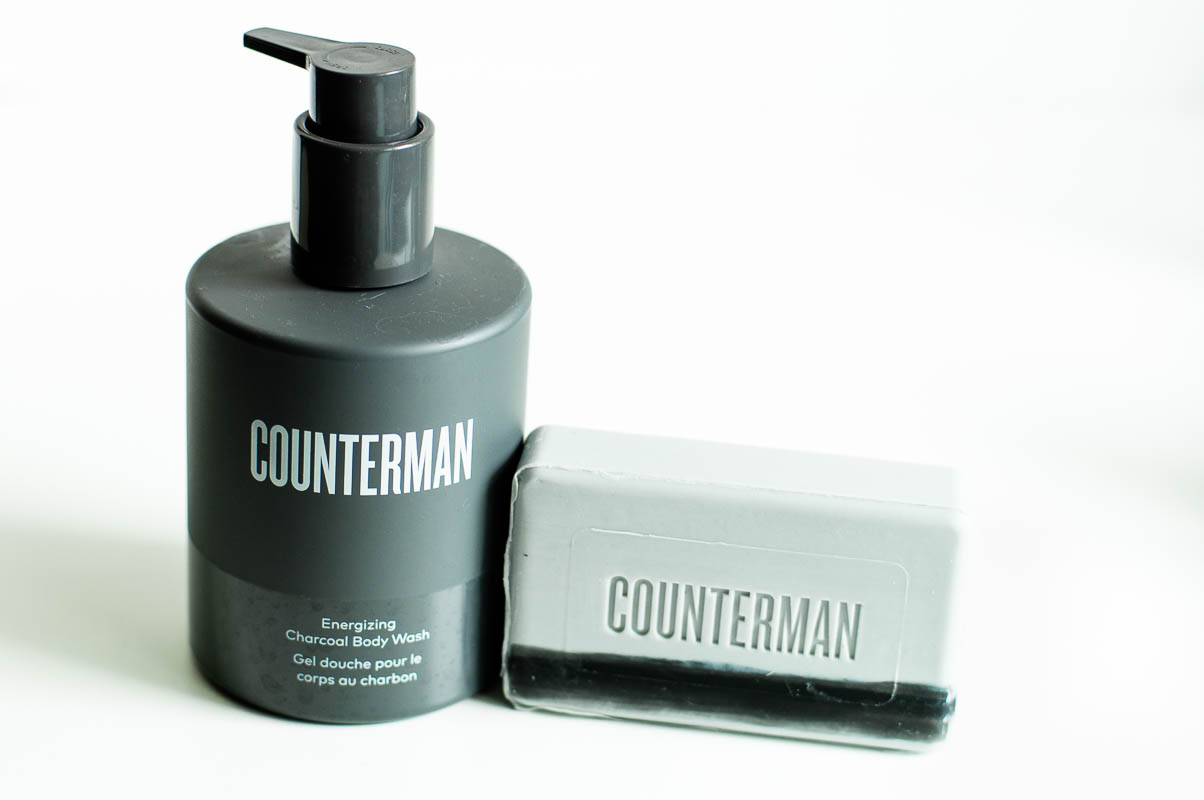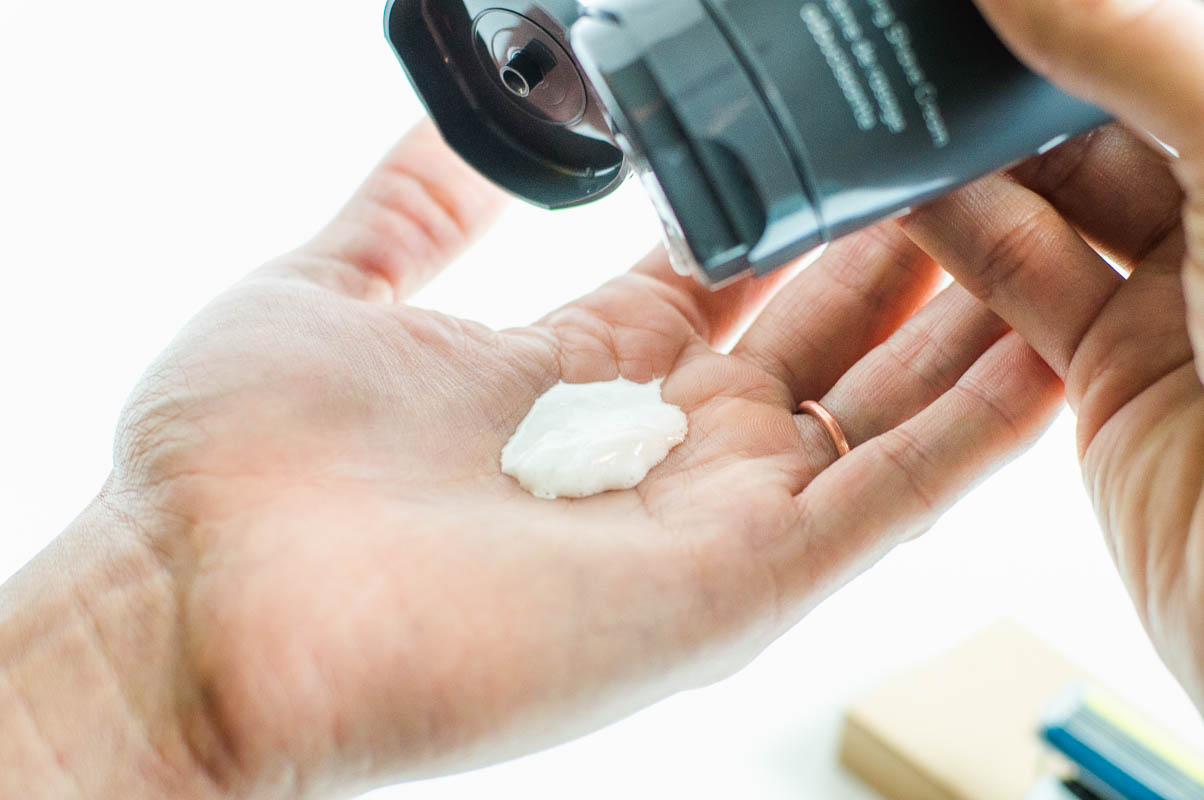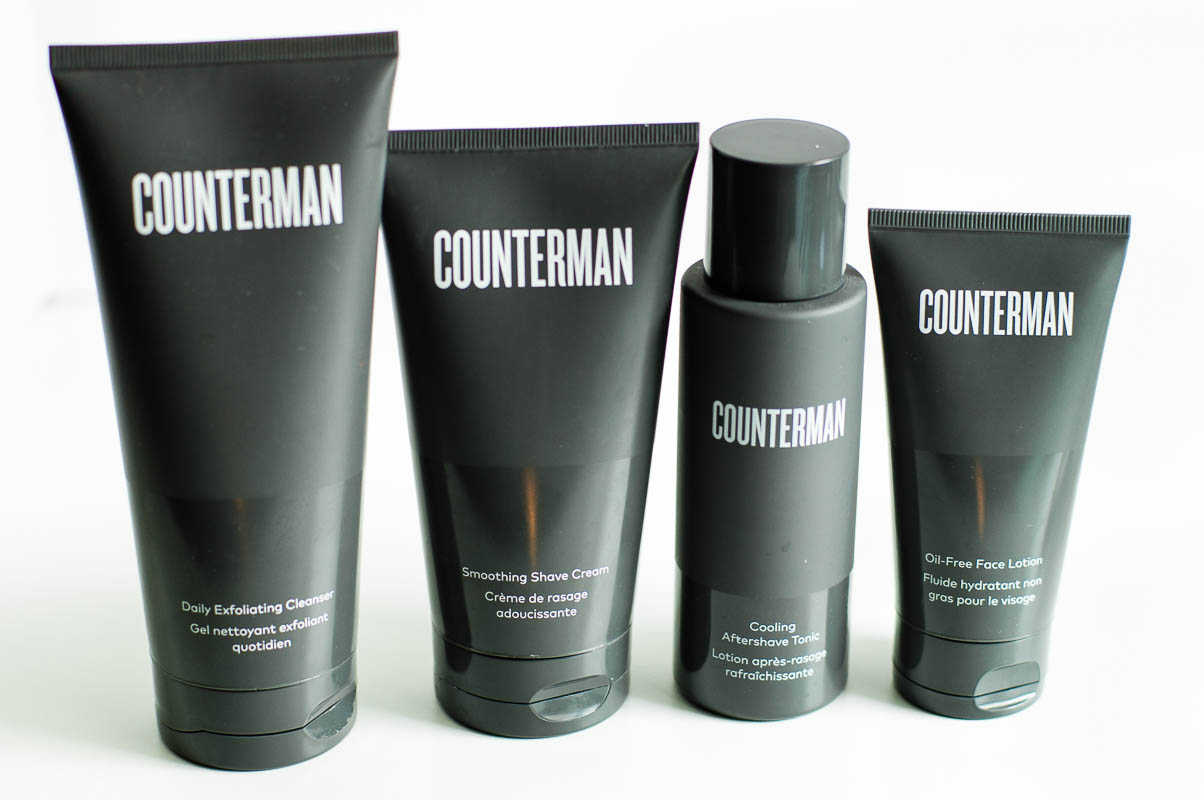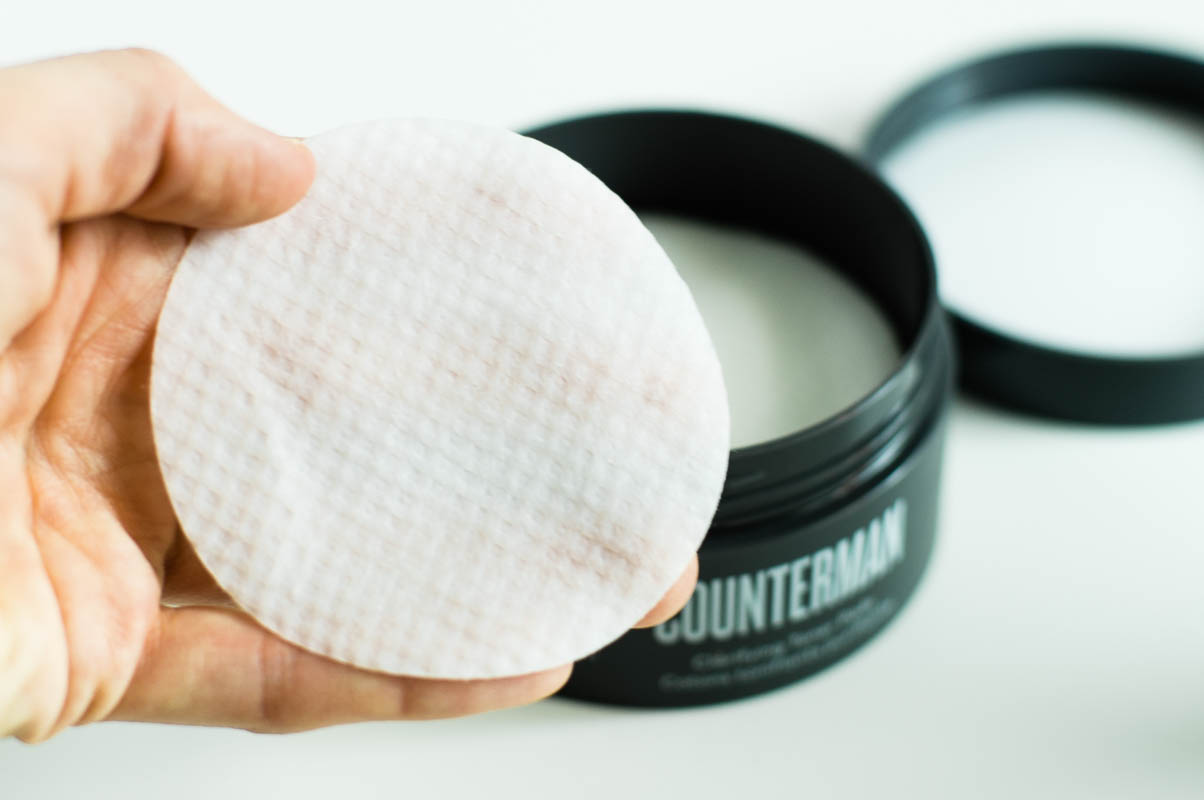Men’s grooming products are one of the fastest growing segments of the overall beauty industry, with men’s skincare being the fastest growing segment within men’s grooming (source). Men are finally catching on and realizing that there are major benefits to having a regular skincare routine!
I’m a little embarrassed to admit that while I have been deeply involved in the safer skincare movement with Beautycounter since 2016, my husband Andy only just started using a regular skincare routine at the end of 2018.
I’ve had discussions with friends, family, and blog readers about men’s skincare, and I’ve learned that there are some common hurdles men face that prevent them from implementing a skincare routine. So I’m going to discuss how to choose the right regimen, how many steps a complete skincare routine should have, and how to choose products that are cleaner and safer - not full of harmful, toxic ingredients.
One of the first important things to know is that men’s skin and women’s skin have very some distinct and significant biological differences, which means we have different needs when it comes to skincare. Since I am a scientist, this stuff fascinates me. Feel free to breeze past this if you’re not interested.
Remember: anyone with skin can benefit from a regular skincare regimen. Ladies, don’t let the men in your life believe that they don’t deserve or need a skincare routine!
The Biological Differences Between Male and female skin
There are quite a few distinct anatomical and physiological differences between men’s skin and women’s skin, and differences in sex hormone levels are thought to be responsible for many of these differences, but genetics and environmental factors have an impact as well.
Outside of the reproductive system, the skin is the largest target on which androgens (like testosterone) and estrogens (estrone, estradiol, estriol) act (source). Interesting, huh?
Here are 5 of the significant ways that male and female skin differs:
Skin Thickness - According to Bailey et al. 2012, men’s skin is 10-20% thicker than women’s, with the biggest differences in thickness seen on the forehead, jowl (area just below and to the side of the mouth), and neck. However, despite being thicker, men’s skin is actually more sensitive to environmental stressors than women’s (source).
Collagen Density - Men have a greater density of collagen compared to women at all ages examined (15-93 years old). Lucky for them! Collagen density decreases for both women and men as we age, but men always have more. (source)
Sebum Production - According to Lubberding et al. 2013, men’s skin always produces more sebum (oil) than women’s, and sebum levels remain stable during their lifetimes, but in women sebum production decreases with age. Thus men’s skin tends to be shinier and more prone to breakouts.
Pore Size - Increased sebum production is associated with larger pores (source), which is why men have larger pores than women, which leaves them vulnerable to blackheads.
Fine Lines, Wrinkles, and Sagging Skin - Because they have a greater density of collagen, men develop fine lines and wrinkles at a later age on average than women, but once they appear they are deeper and under eye sagging is more pronounced compared to age matched women (source).
Top 2 harmful ingredients to avoid in men’s skincare: fragrance (phthalates) and parabens
When it comes to men’s products I would say that the absolute #1 worst ingredient that is pervasive in all products is FRAGRANCE thanks to brands like Axe.
Fragrance (also seen as “parfum” on labels) represents hidden ingredients, an undisclosed mixture of up to dozens of different synthetic scent chemicals and other ingredients like the endocrine disruptor diethyl phthalate (DEP) (which makes the fragrance “sticky” (hard to wash off your skin and clothes).
Fragrance is a known human immune system toxicant and allergen (click here to read more about that). The specific ingredients of fragrance are protected by the Fair Packaging and Labeling Act as “trade secrets”, so you have no way of knowing what you are actually exposing yourself to, no way to have informed consent when you use products with this.
Important: read the ingredients label on the back and look for the word “fragrance” or “parfum”. Many conventional products that may say “unscented,” “hypoallergenic", or “fragrance-free” do still contain masking fragrances to cover the odor of the other ingredients. (source)
I remember when Andy used to use Axe body wash for everything - body and face. I feel a pit in my stomach when I look at the safety rating on the EWG Skin Deep database (so many ingredients in the red danger zone) :-(
phthalates are linked to lower semen and sperm quality
Phthalates like DEP in fragrance are known as endocrine disrupting chemicals (EDCs) or hormone disruptors and there is a rapidly growing body of evidence that these are BAD NEWS for the health of all humans. You can read about the links with breast cancer in this article I wrote.
But since we’re talking about men let me share this quote from this 2016 paper:
“Phthalates cause reduction of sperm count and increase in the frequency of abnormal spermatozoa and DNA strand breaks. The most dangerous seems to be chronic exposure. Damage to male germ cells may lead to induction of mutation and enhanced pre- and postnatal mortality of the offspring. Congenital malformations, delayed sexual maturation, improper sex ratio, shortening of anogenital distance in boys, and deteriorated sperm quality are possible in offspring. The sensitivity on mammalian life stages on phthalates seems to be as follows: fetal > peripubertal > adult.”
Phthalates promote prostate cancer cell proliferation
This has also been shown to happen with breast cancer, too (source). But I’m quoting the plain-language highlight of an Oct 2018 paper here with regards to prostate cancer: “Phthalates induced proliferation in prostate cancer cells.” (source) You kinda don’t need to say more than that. Yikes!
both Phthalates and parabens are anti-androgenic
Phthalates and parabens block androgens (like testosterone) from exerting their normal effects in the body. Here is a quote to help you understand the consequences of that (click here to read the full text of this paper, here for parabens):
“Phthalates are considered to be one of the major groups of anti-androgenic substances. Several toxicological studies have demonstrated a link between phthalate exposure and disorders of male reproductive development, such as hypospadias, cryptorchidism, smaller testes and penis size, alterations of the vas deferens and epididymis, reduction of the anogenital distance and the presence of MNGs, and adult pathologies such as Leydig cell aggregation, Sertoli cell-only tubules, poor spermatogenesis, testicular germ cell tumors and reduced semen quality.”
I hope this helps underscore the importance of switching to safer products. I want to call attention to a portion of one of the above quotes: “The sensitivity on mammalian life stages on phthalates seems to be as follows: fetal > peripubertal > adult”. That means that it is so very important for pre-teens and teens to start using safer products as early as possible.
Getting My Husband To Implement a Complete Skincare Routine
When I polled my readers (who are predominantly female) about whether the man/men in their lives (spouse, boyfriend, son, father, etc.) had a regular skincare routine, over 90% (!!) responded that they don’t, with reasons for why including “it’s too complicated” , “he doesn’t want to spend the money” and “he thinks his skin is doing fine”.
Those are all reasons why my own husband had trouble implementing a skincare routine…. even though he’s married to a skincare consultant. He’s loved the Charcoal Cleansing Bar since day 1. And he’ll do a Charcoal Mask every once in a while. But daily serums and moisturizers? Pshh, get outta here.
When the Countercontrol line (link is to my blog post about it) came out late summer 2018 I purchased a set for Andy to use with high hopes that he’d love it and be motivated to use it twice a day to clear up his acne. It is designed to treat acne and oily skin, but was not necessarily formulated to be a men’s skincare line.
However, I’ve heard from numerous clients that it can be a wonderful regimen for men, especially young men in their late teens/early 20s.
Countercontrol actually made Andy’s skin too dry, and the one part of the regimen that was a dealbreaker for him was the toner. I agree that the delivery method is less than ideal: you have to shake drops of the toner to a cotton pad to wipe the skin (which adds a step to the process). Plus cotton + beard/stubble do not mix well. It’s not fun to have pieces of cotton lint sticking to your facial hair! I don’t blame him for not wanting to use it.
Because the toner was not user-friendly and a point of frustration, the whole routine kind of fell apart. I knew Counterman was right around the corner, though, with the 4-piece preview set that launched for the holiday collection, so I told him to hold steady and wait for it to launch.
Since I am a consultant I was able to pre-order the full collection early to give Andy time to use all of the products and evaluate efficacy. He’s SO happy with his results!
Andy’s Custom Skincare regimen and results
Andy’s daily skincare regimen to address oily skin, acne, and fine lines
Andy is using a mix of products from the Counterman, Countercontrol, and Rejuvenating lines to target oily, acne-prone skin and fine lines. Note: only the Countercontrol line is FDA approved to treat acne and reduce redness; the other lines do not do that. He had no idea where to start or how to create a customized routine for himself, so he was very glad to have my help!
He’s really enjoying this new part of his grooming routine and is just loving how his skin looks and feels! And he is SO happy about the toner pads….they make it so much easier and enjoyable to use the regimen (tip: he cuts them in half to make them last twice as long). Here’s what he’s using, with a refresher on what a complete skincare routine looks like - there are 4 steps:
CLEANSE: Counterman Daily Exfoliating Cleanser
PREP: Counterman Clarifying Toner Pads
TREAT: Countercontrol All Over Acne Treatment (facial serum); Counterman Conditioning Beard Oil
PROTECT: Counterman Oil-Free Face Lotion; Rejuvenating Eye Cream
Here’s how he’s noticed his skin change: he gets less post-shave irritation and redness, his skin is less oily but not too dry (it feels normal for the first time ever!), and he hasn’t had any new acne develop. His skin feels smoother and softer and refreshed, too. In short, he Loves what this regimen has done for him!
Note: only the Countercontrol line is FDA approved to treat acne and reduce redness
So in just a few words, Andy’s honest Beautycounter Counterman review is that it rocks and he’s loving it!
Do you want my 1:1 help in creating a custom skincare regimen for you or a family member? Take a few minutes to fill out my Skincare Consultation Questionnaire and I will get back to you soon with a custom recommendation based on your skin’s needs and your top concerns. I’d love to help!
Even though he has a beard, he does still shave part of his cheeks, neck, and head. So when he shaves, he skips the toner pads and uses the Smoothing Shave Cream followed by the Cooling Aftershave Tonic only on the areas where he shaved. The rest of the routine remains the same.
He and I both use the Dollar Shave Club Executive razor which has 6 blades and the lubricating strip ingredients are vitamin E, aloe, and lavender oil (amazing that they disclose that!)
However I must warn you that I do NOT endorse their skincare products, only their razors. They do not disclose all of their skincare ingredients (major red flag!) so I cannot possibly recommend them. It is a huge bummer that they aggressively try to sell you skincare with the razors, but it’s possible to just order the razors.
Also, fellow women, yes, you can use the Counterman shaving cream! It is AMAZING! A tiny amount goes a long way. It is a lovely foamy smooth cream that spreads well on the legs. What you see pictured here is almost enough for both legs! You’ll be surprised how little you need per leg.
WHAT PRODUCTS ARE IN THE COUNTERMAN COLLECTION?
There are a total of 8 products, including 2 body care products and 6 skincare, both for men who shave and men with beards.
All 8 products are formulated with the sequoia stem cell complex (extract) for its unique antioxidant properties.
Remember the tidbit earlier in the article that even though men’s skin is thicker it is more susceptible to environmental stressors? That’s precisely why Beautycounter added sequoia stem cell complex (extract - I wish they used that word to be 100% clear that there are not live stem cells!) to all Counterman products.
Daily Exfoliating Cleanser ($25): featuring eco-friendly biodegradable jojoba beads to remove dirt, oil and other impurities from pores while soothing the skin with aloe.
Clarifying Toner Pads ($36): Formulated with green tea extract for its anti-aging properties and high antioxidant benefits and skin-soothing properties. The pads are HUGE and can be cut in half to save money without negatively affecting the user experience.
Oil-Free Face Lotion ($32): Non-greasy daily moisturizer to boost hydration while controlling oil with corn starch. It also features taurine, an adaptogen to aid skin’s resiliency. Adaptogens help the body resist physical, chemical, and biological stressors. Unscented.
Smoothing Shave Cream ($20): For a close, comfortable shave, regardless of whether you are a man or a woman! A tiny amount goes a LONG way.
Cooling Aftershave Tonic ($22): Refreshes and cools post-shave irritation with witch hazel, menthol, and taurine.
Conditioning Beard Oil ($30): To groom, condition facial hair, and relieve dry skin. Uses a blend of sunflower seed oil, macadamia seed oil, and jojoba oil.
Energizing Charcoal Body Wash ($25): Cleanses impurities and helps detoxify with activated charcoal. I love the scent - citrus, mint, rosemary, and cedarwood. Amazing!
Charcoal Body Bar ($19): Invigorating bar soap washes away impurities with the unique ingredient white charcoal, sustainably derived from the Ubame oak, which contains a variety of minerals that were absorbed during the tree’s lifetime. Same scent as the body wash, and these products can be used interchangeably depending on your preference of using a bar vs. body wash.
Save 10-20% on Counterman
Ready to overhaul skincare, grooming, and body care needs? You’ll save 20% when you purchase the complete 8-piece Counterman bundle.
There are also two 4-piece regimens available at a 10% discount + choice of free gift: the Beard Regimen and the Shave Regimen.
In fact, all of our regimens are 10% off! So no matter what your skin type you can choose a set that perfect for your needs and enjoy a nice little discount.
What do other men say about Counterman?
After 4 weeks of using Counterman Daily Exfoliating Cleanser, Clarifying Toner Pads and Oil-Free Face Lotion*:
100% said skin felt firmer
90% said skin texture looked and felt smoother and more even
93% said skin felt hydrated
84% said pores appeared smaller
*In a 4-week independent sensory perception study of 33 men using Counterman Daily Exfoliating Cleanser, Clarifying Toner Pads and Oil-Free Face Lotion twice daily.
Andy agrees with all 4 of these points! He’s so thrilled and so am I to have a high-performance skincare regimen that actually works without harsh, harmful, or toxic ingredients.
I know not everyone is as geeky as me when it comes to scientific data, so you can just stop reading now if you’re not interested. But if you wanna know more about stem cell extracts (and some more about my background as a neuroscience researcher) this last bit is for you :-)
Stem cell extracts in skincare
First, a short rant about live stem cells vs stem cell extracts from a former stem cell researcher
Did you know the last job I had working in biomedical research was in a stem cell lab? We studied the use of adult bone marrow derived mesenchymal stem cells (MSCs) as a treatment to heal the brain after stroke. We looked at both autologous (derived from the patient) and allogeneic (from a healthy donor) MSCs.
I’m telling you this to let you know that this is a field where I have professional experience. And I want to warn you that there is SO MUCH MISINFORMATION on the internet about stem cells and skincare.
Guess what? There are no over-the-counter skincare products with live stem cells in them. What you find in Counterman and other products are stem cell extracts.
This is a HUGE and very important distinction. But this doesn’t stop articles with titles like “stem cells for anti-aging”, “4 plant stem cell products to try for advanced skincare”, and “plant stem cells: skincare benefits” from being published. I cannot roll my eyes hard enough when I see articles like this!
Do you know how difficult it is to keep stem cells alive?!! They require extremely precise conditions in a cell culture medium in an incubator to remain viable. You have to feed them, too! In one of the studies I assisted with, we had a very short time window between removing the stem cells from the incubator, preparing them for injection, and delivering them into the patient intra-arterially. So, it’s impossible (these researchers agree) for live stem cells to survive in any skincare formulation.
But plant stem cell extracts? Absolutely feasible and a wonderful addition to skincare products.
Benefits of plant stem cell extracts in skincare
There is a growing body of scientific evidence that extracts from plant stem cells can have very positive effects for our skin and are a robust source of antioxidants.
Here is a list of positive cosmetic effects that have been observed from a variety of different plant stem cells, quoted from this paper:
extending the life of fibroblasts and stimulating their activity (e.g., Oryza sativa, Gardenia jasminoides);
increasing the flexibility of the epidermis (e.g., Symphytum officinale, Capsicum annuum, Opuntia spp.);
regulating cell division (e.g., Oryza sativa, Lotus japonicus);
rebuilding damaged epidermis (e.g., Panax ginsgen, Opuntia spp.);
activating DNA repair of the cells, protecting them from oxidative stress (e.g., Rubus ideaus, Lycopersicon esculentum, e.g., Citrus limon);
protecting against UV radiation (e.g., Dolichos biflorus, Opuntia ficus indica).
I am waiting to hear back from Beautycounter to learn the specifics of why they chose sequoia stem cells to take their extracts from, I will update this post when I know more!
Regardless of the species they are derived from, plant stem cell extracts are a source of many beneficial active substances, including polyphenols, phenolic acids, triterpenes, flavonoids, carotenoids, fatty aicds, sugars, and peptides which are responsible for their anti-aging properties (source).
And now, if you’re really geeky, you can peruse all of the references. I read many more than this but didn’t directly cite them.
Article References
Biological differences in skin create challenges in treating men. (n.d.). Retrieved January 15, 2019, from https://aadmeetingnews.org/2014-summer-academy-wrap-up/biological-differences-in-skin-create-challenges-in-treating-men/
Rahrovan, S., Fanian, F., Mehryan, P., Humbert, P., & Firooz, A. (2018). Male versus female skin: What dermatologists and cosmeticians should know. International Journal of Women’s Dermatology, 4(3), 122–130.
El Safoury, O., Rashid, L., & Ibrahim, M. (2010). A study of androgen and estrogen receptors alpha, beta in skin tags. Indian Journal of Dermatology, 55(1), 20–24.
Bailey, S. H., Oni, G., Brown, S. A., Kashefi, N., Cheriyan, S., Maxted, M., … Kenkel, J. M. (2012). The use of non-invasive instruments in characterizing human facial and abdominal skin. Lasers in Surgery and Medicine, 44(2), 131–142.
Luebberding, S., Krueger, N., & Kerscher, M. (2013). Skin physiology in men and women: in vivo evaluation of 300 people including TEWL, SC hydration, sebum content and skin surface pH. International Journal of Cosmetic Science, 35(5), 477–483.
Roh, M., Han, M., Kim, D., & Chung, K. (2006). Sebum output as a factor contributing to the size of facial pores. The British Journal of Dermatology, 155(5), 890–894.
Arai, K. Y., Hara, T., Nagatsuka, T., Kudo, C., Tsuchiya, S., Nomura, Y., & Nishiyama, T. (2017). Postnatal changes and sexual dimorphism in collagen expression in mouse skin. PloS One, 12(5), e0177534.
Trehan, S., Michniak-Kohn, B., & Beri, K. (2017). Plant stem cells in cosmetics: current trends and future directions. Future Science OA, 3(4), FSO226.
Allergic Contact Dermatitis to Preservatives and Fragrances in Cosmetics. (2011, April 1). Retrieved January 15, 2019, from http://www.skintherapyletter.com/allergic-contact-dermatitis/cosmetics/
Miastkowska, M., & Sikora, E. (2018). Anti-Aging Properties of Plant Stem Cell Extracts. Cosmetics and Toiletries, 5(4), 55.
Barbulova, A., Apone, F., & Colucci, G. (2014). Plant Cell Cultures as Source of Cosmetic Active Ingredients. Cosmetics and Toiletries, 1(2), 94–104.
Dobrzyńska, M. M. (2016). Phthalates - widespread occurrence and the effect on male gametes. Part 2. The effects of phthalates on male gametes and on the offspring. Roczniki Panstwowego Zakladu Higieny, 67(3), 209–221.
Hsieh, T.-H., Tsai, C.-F., Hsu, C.-Y., Kuo, P.-L., Lee, J.-N., Chai, C.-Y., … Tsai, E.-M. (2012). Phthalates induce proliferation and invasiveness of estrogen receptor-negative breast cancer through the AhR/HDAC6/c-Myc signaling pathway. FASEB Journal: Official Publication of the Federation of American Societies for Experimental Biology, 26(2), 778–787.
Zhu, M., Huang, C., Ma, X., Wu, R., Zhu, W., Li, X., … Zhong, C. (2018). Phthalates promote prostate cancer cell proliferation through activation of ERK5 and p38. Environmental Toxicology and Pharmacology, 63, 29–33.
De Falco, M., Forte, M., & Laforgia, V. (2015). Estrogenic and anti-androgenic endocrine disrupting chemicals and their impact on the male reproductive system. Frontiers of Environmental Science & Engineering in China, 3, 3.















